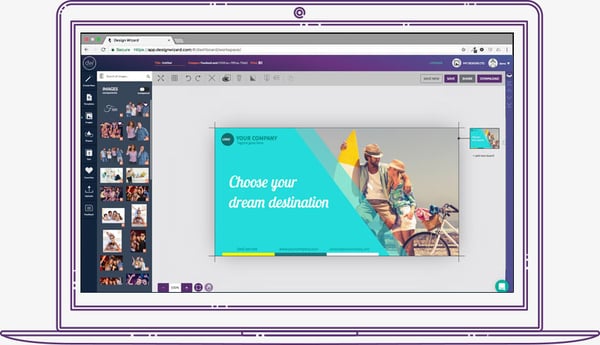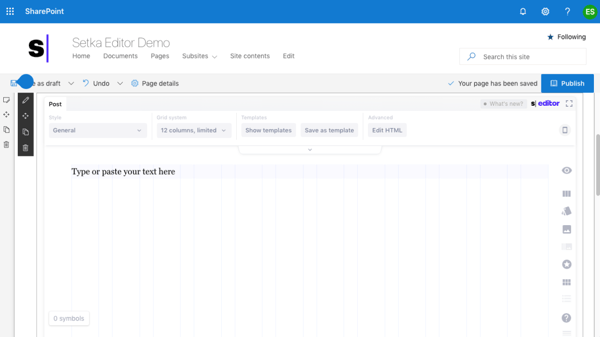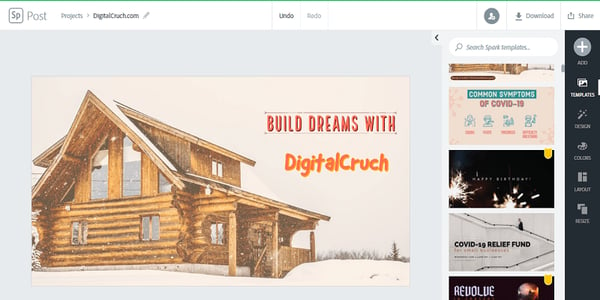Artists and Graphic Designer's Market 2017
When it comes to website success, what you see is what you get. While compelling text, blog, and social media content can help set your brand apart from the competition, the visual appeal of your site is the first thing users see when they follow backlinks or click through search engine results. Recent research found that it takes just 2.6 seconds for users' eyes to focus on a specific area of your website. What's more, it takes just 0.05 seconds for visitors to form a general first impression of your site — meaning you've got just one opportunity to change their minds or reinforce this impression, and it happens in the first three seconds of arrival. As a result, it's critical to create webpages that are both aesthetically appealing and contextually relevant. For larger businesses, this often means hiring dedicated graphic designers to develop eye-catching designs and deploy them consistently across web pages, but SMB budgets may not support this type of spending. If your research turns up a problem — your images aren't compelling, your text is hard to read and your color scheme hurts the eyes — you need a simple solution. Free graphic design software offers the ability to customize the look and feel of your site without breaking the bank. But with a host of options on the market, which is the best fit for your business? Two broad factors impact this outcome: Your current graphical ability and your potential use case. For example, if you have no experience with graphic tools, look for a solution that's simple, streamlined, and does most of the work behind-the-scenes. If you have a graphic design background or natural inclination, tools with more robust customization and control may be a better fit. If you're planning to revamp your entire site with new colors, images, logos, and menus, you'll need an in-depth solution that provides this level of control. If you're starting small with minor changes to your color scheme or image quality, this kind of granular adjustment isn't necessary. So which software tool is the best fit for your business? Here's a look at some of the best free graphic design tools and some pros and cons for each. DesignWizard ranks among the best free graphic design software for beginners. The tool offers a large database of images along with a host of free templates (over 10,000), plus a simple, easy-to-use interface. While you can also quickly create custom templates, DesignWizard excels as a front-line, free graphic design tool for beginners. Despite an easy-to-use interface and no upfront costs, it's worth noting that most of the more powerful options in DesignWizard are only available in its for-pay version. Setka bills itself as "everything you need to create content that converts." This graphic design software is primarily focused on delivering enhanced content branding across your website, ad campaigns, and social media posts — and works from within your current CMS or in the cloud. The caveat? Although the Setka Editor is free to try for two weeks, companies will need to select a plan — Starter, Pro, or Enterprise — to unlock the full feature set and keep using Setka. Whether you're looking to create an ebook, infographic, business card, or email header, Canva has a template to simplify your process. The free web design tool, developed by non-designers, offers professional, easy-to-customize templates for just about any design need you can think of. The drawback? You might need to invest in the paid version or try one of the more advanced free graphic design softwares as you skill up. While Canva's free version is great for new designers working with templates, you can access more complex tools and features — such as team sharing — in the paid version. Adobe Spark is a free alternative to the company's popular, for-pay Adobe Illustrator. While it's not nearly as full-featured, it does support integration with other Adobe products. It's easy to use and it comes with a host of free templates. If you're looking to quickly create posters or videos for ad campaigns, Spark is a great choice. The potential drawback? A limited feature set makes this a great starting point for beginners but less useful for more in-depth projects or experienced designers. The good news is that Spark is available for both web and mobile, meaning you can design anywhere, anytime. Krita is a free, open-source painting program made by artists, for artists. Ongoing development of this tool depends on donations and is driven by the needs of the designer community at large. It's no surprise, then, that Krita includes a customizable user interface, feature-rich toolset, and a comprehensive resource manager. For businesses looking to boost their graphic design impact, Krita is a great tool — if they have the help of an experienced designer. For companies in need of simple, streamlined solutions, other software on this list offers a better fit for beginners. Image Source Gravit is a vector design application created by the makers of Corel Draw. With a host of tools for creating vector art and a self-adjusting interface, Gravit earns its place among the best free graphic design software for Mac and Windows — the tool is also available for ChromeOS and Linux. Worth noting? When you sign up for a free trial of Gravit you automatically get access to "Pro" features, including the ability to work offline and see version history. However, you lose these features when your trial is up unless you're willing to pay for a subscription. Blender is an open-source, 3D creation suite that makes it possible for graphic designers to create everything from rigging to animation to rendering and motion tracking. It also provides support for 2D animation and has an active community of users committed to helping Blender improve. While Blender is a powerful tool, it's not ideal for beginners — complex menus and a massive amount of design options mean you need to know your way around graphic design basics to make the best use of this tool. Its tagline is "draw freely" and Inkscape lives up to that mantra — there's no cost for this graphic design tool and it packs a host of features for both beginners and experienced marketers. In addition to cross-platform support and an active community, Inkscape is known for superior vector art options and wide format compatibility. One drawback is that the sluggish controls can frustrate some users if they're looking to quickly create and publish designs. SketchUp offers both free and paid design plans, with its no-cost version still offering substantial advantages for designers. A robust modeling platform, it's a great tool for creating 2D or 3D designs for furniture or other complex objects. With an easy-to-use interface and great support, SketchUp is a great tool if you're looking to create product pages that feature in-depth images and dimensions. Potential drawbacks include limited storage space for free plans and no mobile support. One of the most popular open-source design tools, Gimp is often compared to its closest for-pay competitor, Photoshop, with users on both sides making passionate arguments for one platform over the other. Gimp gets high praise as a free design tool for its support of all file formats, ease of digital retouching, and ability to quickly create new designs from scratch. In addition, Gimp features a customizable interface that allows more experienced designers to make use of the tool's capabilities. Worth noting? Gimp does not support any Photoshop plugins. Genially makes design easy with a user-friendly interface and robust options that allow designers to create their own artwork from scratch. With this software, you can leverage pre-built templates or add interactive features such as buttons, layers, and hidden text. The free version of Genially has no limits on the number of projects you can create and there are now more than 12,000,000 users worldwide designing with Genially and supporting the community. There is a caveat, however. While the free version is substantive, some features — such as offline viewing and brand personalization — are reserved for paid plans only. The classic Microsoft design tool is back, free, and updated to deliver more functionality. While it can't compete with some of the more robust design tools on our list, Paint 3D comes with realistic textures, 2D cutout creation, and a host of 3D tools and effects. If you're a beginner looking for an easy bar to entry for straightforward graphic design, Paint 3D is a great place to start. There's virtually no learning curve and since it's made by Microsoft, the tool naturally works well on all Windows 10 devices. Most of the tools on this list are available on multiple platforms — including PC, Mac, and mobile — but is there a distinct advantage to selecting one platform over the other? The short answer: Not really. These tools offer the same functionality regardless of which platform you choose. The not-so-short answer? For beginners, opting for PC or mobile is probably your best choice. While Macs remain a powerhouse for graphic design, their user interface (UI) is less intuitive than their PC and mobile counterparts. This presents a learning curve you likely don't need if you're just getting started with graphic design. For graphic design professionals and marketing experts, Mac-based solutions may be preferable for their focus on function over form. The first thing users see when they land on your website significantly impacts their perception of your brand — and their likelihood to become paying customers. The right graphic design software ensures your site delivers visual value from first impressions to eventual purchases and streamlines the process of ongoing aesthetic adjustment. This post was originally published in Dec 2020 and has been updated for comprehensiveness. 
What is the Best Free Graphic Design Software?
The Best Free Graphic Design Software for Marketers and Beginners
1. DesignWizard
Platform: Windows

2. Setka Editor
Platforms: Windows, Mac

3. Canva
Platforms: Windows, Mac, Android, iOS
4. Adobe Spark
Platforms: Windows, Mac, Android, iOS

5. Krita
Platforms: Windows, Mac, Android, Linux
6. Gravit
Platforms: PC, Mac, Chrome OS, Linux

7. Blender
Platforms: Windows, Mac, Linux
8. Inkscape
Platforms: Windows, Mac, Linux
9. SketchUp
Platforms: Windows, Mac
10. Gimp
Platforms: Windows, Mac, Linux
11. Genially
Platform: Windows
12. Paint 3D
Platform: Windows
Picking the Right Platform for Graphic Design
Creating a Great First Impression


Originally published Jun 3, 2021 7:00:00 AM, updated June 03 2021
Artists and Graphic Designer's Market 2017
Source: https://blog.hubspot.com/marketing/best-free-graphic-design-software
Post a Comment for "Artists and Graphic Designer's Market 2017"